Stewardship and Governance: Theories and Organizational Effectiveness
VerifiedAdded on 2022/11/15
|11
|3117
|2
Essay
AI Summary
This essay delves into the critical aspects of governance and stewardship within organizations. It begins by defining governance and stewardship, highlighting their roles in ethical leadership and organizational success. The paper explores key governance theories, including stakeholder theory, virtue ethics, and agency theory, analyzing their strengths, weaknesses, and practical applications. It also examines the contribution of stewardship theory, emphasizing its sociological and psychological foundations, particularly within non-profit organizations. The essay further investigates the impact of leader's values and beliefs on organizational effectiveness, emphasizing the importance of trust-building and ethical leadership. Through a comprehensive analysis of these theories, the paper offers valuable insights into the complexities of organizational management and the crucial role of ethical practices and leadership in achieving sustainable success. The analysis incorporates the role of leaders and their values and beliefs in bringing organizational effectiveness.
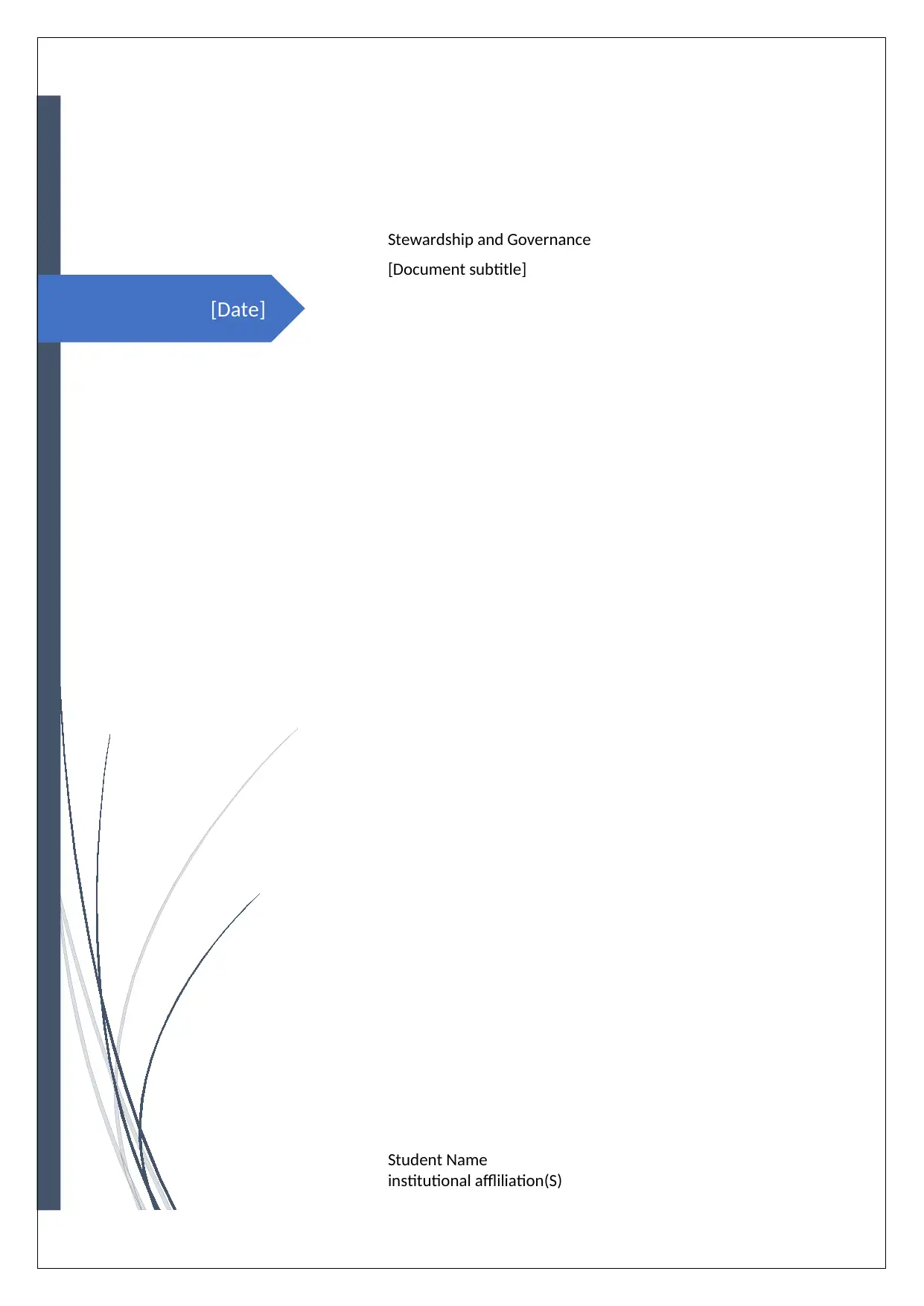
[Date]
Stewardship and Governance
[Document subtitle]
Student Name
institutional affliliation(S)
Stewardship and Governance
[Document subtitle]
Student Name
institutional affliliation(S)
Paraphrase This Document
Need a fresh take? Get an instant paraphrase of this document with our AI Paraphraser
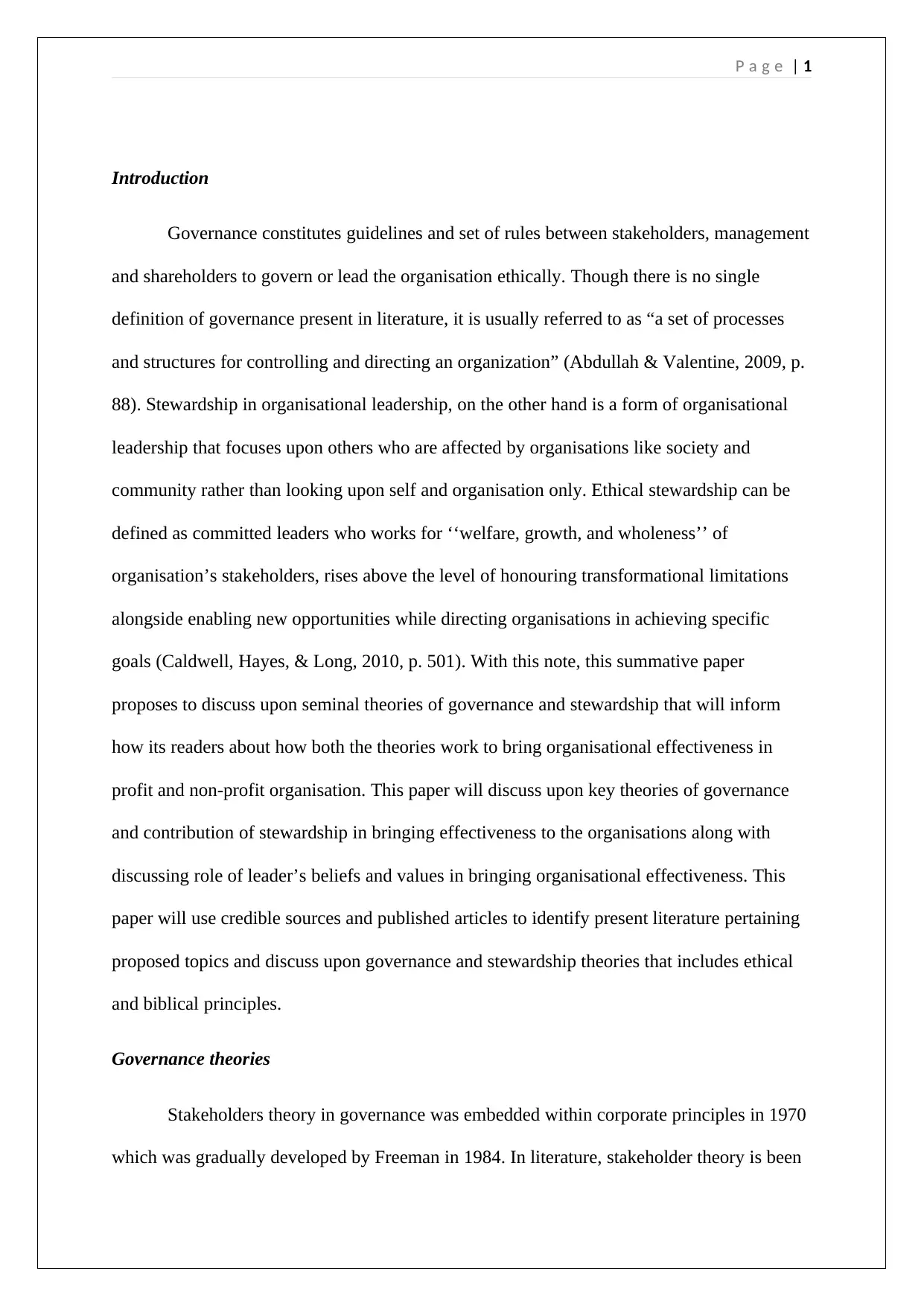
P a g e | 1
Introduction
Governance constitutes guidelines and set of rules between stakeholders, management
and shareholders to govern or lead the organisation ethically. Though there is no single
definition of governance present in literature, it is usually referred to as “a set of processes
and structures for controlling and directing an organization” (Abdullah & Valentine, 2009, p.
88). Stewardship in organisational leadership, on the other hand is a form of organisational
leadership that focuses upon others who are affected by organisations like society and
community rather than looking upon self and organisation only. Ethical stewardship can be
defined as committed leaders who works for ‘‘welfare, growth, and wholeness’’ of
organisation’s stakeholders, rises above the level of honouring transformational limitations
alongside enabling new opportunities while directing organisations in achieving specific
goals (Caldwell, Hayes, & Long, 2010, p. 501). With this note, this summative paper
proposes to discuss upon seminal theories of governance and stewardship that will inform
how its readers about how both the theories work to bring organisational effectiveness in
profit and non-profit organisation. This paper will discuss upon key theories of governance
and contribution of stewardship in bringing effectiveness to the organisations along with
discussing role of leader’s beliefs and values in bringing organisational effectiveness. This
paper will use credible sources and published articles to identify present literature pertaining
proposed topics and discuss upon governance and stewardship theories that includes ethical
and biblical principles.
Governance theories
Stakeholders theory in governance was embedded within corporate principles in 1970
which was gradually developed by Freeman in 1984. In literature, stakeholder theory is been
Introduction
Governance constitutes guidelines and set of rules between stakeholders, management
and shareholders to govern or lead the organisation ethically. Though there is no single
definition of governance present in literature, it is usually referred to as “a set of processes
and structures for controlling and directing an organization” (Abdullah & Valentine, 2009, p.
88). Stewardship in organisational leadership, on the other hand is a form of organisational
leadership that focuses upon others who are affected by organisations like society and
community rather than looking upon self and organisation only. Ethical stewardship can be
defined as committed leaders who works for ‘‘welfare, growth, and wholeness’’ of
organisation’s stakeholders, rises above the level of honouring transformational limitations
alongside enabling new opportunities while directing organisations in achieving specific
goals (Caldwell, Hayes, & Long, 2010, p. 501). With this note, this summative paper
proposes to discuss upon seminal theories of governance and stewardship that will inform
how its readers about how both the theories work to bring organisational effectiveness in
profit and non-profit organisation. This paper will discuss upon key theories of governance
and contribution of stewardship in bringing effectiveness to the organisations along with
discussing role of leader’s beliefs and values in bringing organisational effectiveness. This
paper will use credible sources and published articles to identify present literature pertaining
proposed topics and discuss upon governance and stewardship theories that includes ethical
and biblical principles.
Governance theories
Stakeholders theory in governance was embedded within corporate principles in 1970
which was gradually developed by Freeman in 1984. In literature, stakeholder theory is been
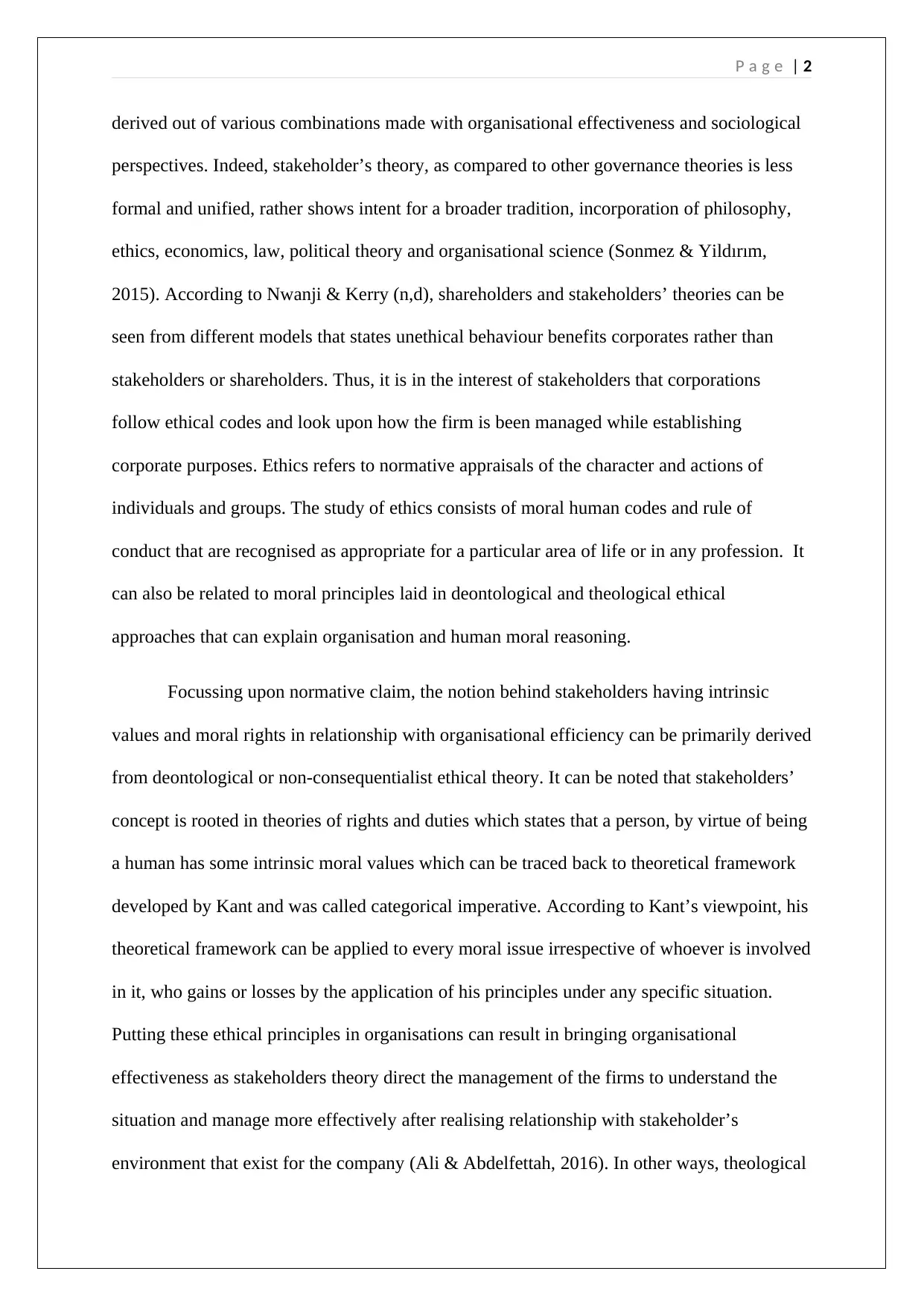
P a g e | 2
derived out of various combinations made with organisational effectiveness and sociological
perspectives. Indeed, stakeholder’s theory, as compared to other governance theories is less
formal and unified, rather shows intent for a broader tradition, incorporation of philosophy,
ethics, economics, law, political theory and organisational science (Sonmez & Yildırım,
2015). According to Nwanji & Kerry (n,d), shareholders and stakeholders’ theories can be
seen from different models that states unethical behaviour benefits corporates rather than
stakeholders or shareholders. Thus, it is in the interest of stakeholders that corporations
follow ethical codes and look upon how the firm is been managed while establishing
corporate purposes. Ethics refers to normative appraisals of the character and actions of
individuals and groups. The study of ethics consists of moral human codes and rule of
conduct that are recognised as appropriate for a particular area of life or in any profession. It
can also be related to moral principles laid in deontological and theological ethical
approaches that can explain organisation and human moral reasoning.
Focussing upon normative claim, the notion behind stakeholders having intrinsic
values and moral rights in relationship with organisational efficiency can be primarily derived
from deontological or non-consequentialist ethical theory. It can be noted that stakeholders’
concept is rooted in theories of rights and duties which states that a person, by virtue of being
a human has some intrinsic moral values which can be traced back to theoretical framework
developed by Kant and was called categorical imperative. According to Kant’s viewpoint, his
theoretical framework can be applied to every moral issue irrespective of whoever is involved
in it, who gains or losses by the application of his principles under any specific situation.
Putting these ethical principles in organisations can result in bringing organisational
effectiveness as stakeholders theory direct the management of the firms to understand the
situation and manage more effectively after realising relationship with stakeholder’s
environment that exist for the company (Ali & Abdelfettah, 2016). In other ways, theological
derived out of various combinations made with organisational effectiveness and sociological
perspectives. Indeed, stakeholder’s theory, as compared to other governance theories is less
formal and unified, rather shows intent for a broader tradition, incorporation of philosophy,
ethics, economics, law, political theory and organisational science (Sonmez & Yildırım,
2015). According to Nwanji & Kerry (n,d), shareholders and stakeholders’ theories can be
seen from different models that states unethical behaviour benefits corporates rather than
stakeholders or shareholders. Thus, it is in the interest of stakeholders that corporations
follow ethical codes and look upon how the firm is been managed while establishing
corporate purposes. Ethics refers to normative appraisals of the character and actions of
individuals and groups. The study of ethics consists of moral human codes and rule of
conduct that are recognised as appropriate for a particular area of life or in any profession. It
can also be related to moral principles laid in deontological and theological ethical
approaches that can explain organisation and human moral reasoning.
Focussing upon normative claim, the notion behind stakeholders having intrinsic
values and moral rights in relationship with organisational efficiency can be primarily derived
from deontological or non-consequentialist ethical theory. It can be noted that stakeholders’
concept is rooted in theories of rights and duties which states that a person, by virtue of being
a human has some intrinsic moral values which can be traced back to theoretical framework
developed by Kant and was called categorical imperative. According to Kant’s viewpoint, his
theoretical framework can be applied to every moral issue irrespective of whoever is involved
in it, who gains or losses by the application of his principles under any specific situation.
Putting these ethical principles in organisations can result in bringing organisational
effectiveness as stakeholders theory direct the management of the firms to understand the
situation and manage more effectively after realising relationship with stakeholder’s
environment that exist for the company (Ali & Abdelfettah, 2016). In other ways, theological
⊘ This is a preview!⊘
Do you want full access?
Subscribe today to unlock all pages.

Trusted by 1+ million students worldwide
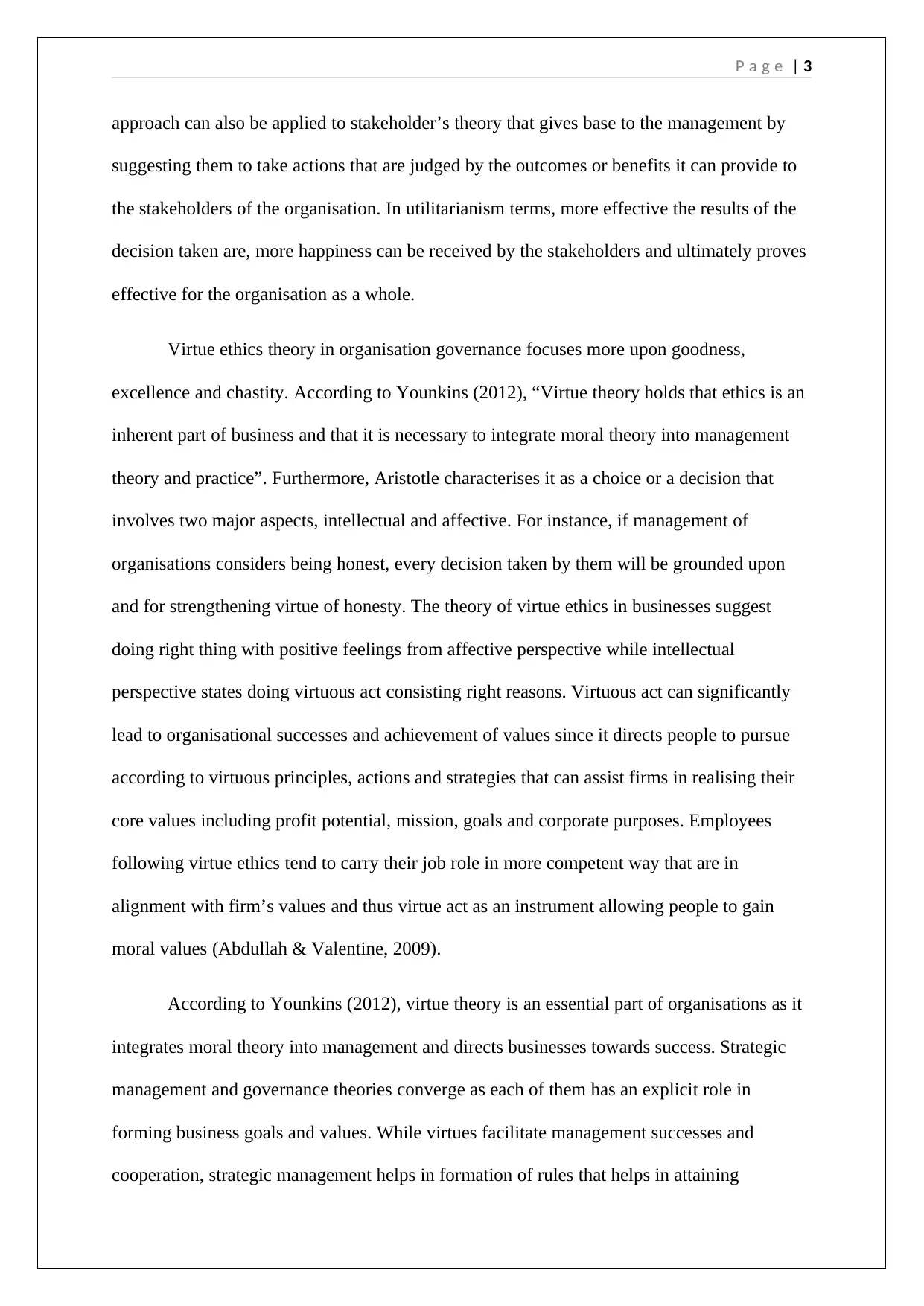
P a g e | 3
approach can also be applied to stakeholder’s theory that gives base to the management by
suggesting them to take actions that are judged by the outcomes or benefits it can provide to
the stakeholders of the organisation. In utilitarianism terms, more effective the results of the
decision taken are, more happiness can be received by the stakeholders and ultimately proves
effective for the organisation as a whole.
Virtue ethics theory in organisation governance focuses more upon goodness,
excellence and chastity. According to Younkins (2012), “Virtue theory holds that ethics is an
inherent part of business and that it is necessary to integrate moral theory into management
theory and practice”. Furthermore, Aristotle characterises it as a choice or a decision that
involves two major aspects, intellectual and affective. For instance, if management of
organisations considers being honest, every decision taken by them will be grounded upon
and for strengthening virtue of honesty. The theory of virtue ethics in businesses suggest
doing right thing with positive feelings from affective perspective while intellectual
perspective states doing virtuous act consisting right reasons. Virtuous act can significantly
lead to organisational successes and achievement of values since it directs people to pursue
according to virtuous principles, actions and strategies that can assist firms in realising their
core values including profit potential, mission, goals and corporate purposes. Employees
following virtue ethics tend to carry their job role in more competent way that are in
alignment with firm’s values and thus virtue act as an instrument allowing people to gain
moral values (Abdullah & Valentine, 2009).
According to Younkins (2012), virtue theory is an essential part of organisations as it
integrates moral theory into management and directs businesses towards success. Strategic
management and governance theories converge as each of them has an explicit role in
forming business goals and values. While virtues facilitate management successes and
cooperation, strategic management helps in formation of rules that helps in attaining
approach can also be applied to stakeholder’s theory that gives base to the management by
suggesting them to take actions that are judged by the outcomes or benefits it can provide to
the stakeholders of the organisation. In utilitarianism terms, more effective the results of the
decision taken are, more happiness can be received by the stakeholders and ultimately proves
effective for the organisation as a whole.
Virtue ethics theory in organisation governance focuses more upon goodness,
excellence and chastity. According to Younkins (2012), “Virtue theory holds that ethics is an
inherent part of business and that it is necessary to integrate moral theory into management
theory and practice”. Furthermore, Aristotle characterises it as a choice or a decision that
involves two major aspects, intellectual and affective. For instance, if management of
organisations considers being honest, every decision taken by them will be grounded upon
and for strengthening virtue of honesty. The theory of virtue ethics in businesses suggest
doing right thing with positive feelings from affective perspective while intellectual
perspective states doing virtuous act consisting right reasons. Virtuous act can significantly
lead to organisational successes and achievement of values since it directs people to pursue
according to virtuous principles, actions and strategies that can assist firms in realising their
core values including profit potential, mission, goals and corporate purposes. Employees
following virtue ethics tend to carry their job role in more competent way that are in
alignment with firm’s values and thus virtue act as an instrument allowing people to gain
moral values (Abdullah & Valentine, 2009).
According to Younkins (2012), virtue theory is an essential part of organisations as it
integrates moral theory into management and directs businesses towards success. Strategic
management and governance theories converge as each of them has an explicit role in
forming business goals and values. While virtues facilitate management successes and
cooperation, strategic management helps in formation of rules that helps in attaining
Paraphrase This Document
Need a fresh take? Get an instant paraphrase of this document with our AI Paraphraser
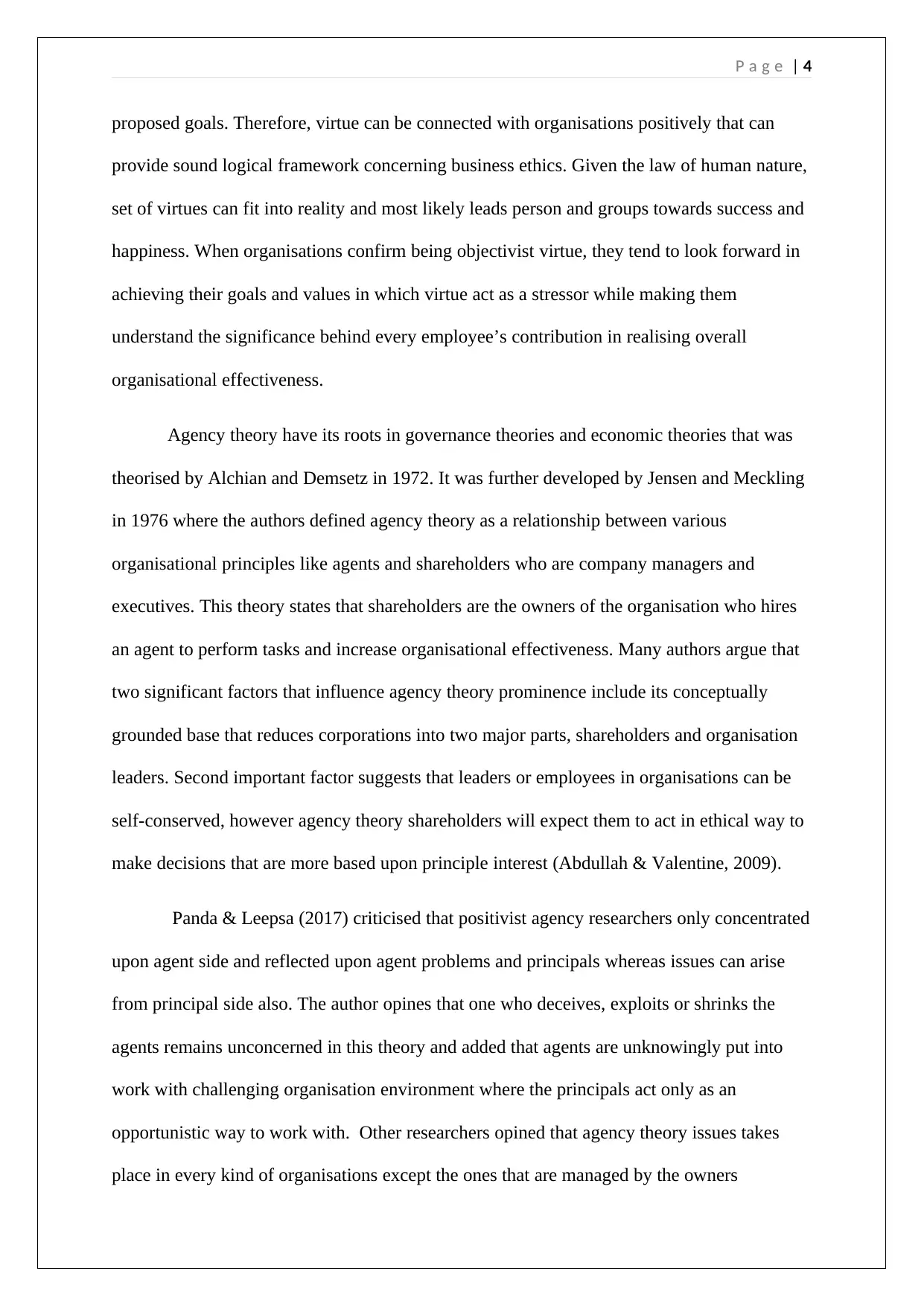
P a g e | 4
proposed goals. Therefore, virtue can be connected with organisations positively that can
provide sound logical framework concerning business ethics. Given the law of human nature,
set of virtues can fit into reality and most likely leads person and groups towards success and
happiness. When organisations confirm being objectivist virtue, they tend to look forward in
achieving their goals and values in which virtue act as a stressor while making them
understand the significance behind every employee’s contribution in realising overall
organisational effectiveness.
Agency theory have its roots in governance theories and economic theories that was
theorised by Alchian and Demsetz in 1972. It was further developed by Jensen and Meckling
in 1976 where the authors defined agency theory as a relationship between various
organisational principles like agents and shareholders who are company managers and
executives. This theory states that shareholders are the owners of the organisation who hires
an agent to perform tasks and increase organisational effectiveness. Many authors argue that
two significant factors that influence agency theory prominence include its conceptually
grounded base that reduces corporations into two major parts, shareholders and organisation
leaders. Second important factor suggests that leaders or employees in organisations can be
self-conserved, however agency theory shareholders will expect them to act in ethical way to
make decisions that are more based upon principle interest (Abdullah & Valentine, 2009).
Panda & Leepsa (2017) criticised that positivist agency researchers only concentrated
upon agent side and reflected upon agent problems and principals whereas issues can arise
from principal side also. The author opines that one who deceives, exploits or shrinks the
agents remains unconcerned in this theory and added that agents are unknowingly put into
work with challenging organisation environment where the principals act only as an
opportunistic way to work with. Other researchers opined that agency theory issues takes
place in every kind of organisations except the ones that are managed by the owners
proposed goals. Therefore, virtue can be connected with organisations positively that can
provide sound logical framework concerning business ethics. Given the law of human nature,
set of virtues can fit into reality and most likely leads person and groups towards success and
happiness. When organisations confirm being objectivist virtue, they tend to look forward in
achieving their goals and values in which virtue act as a stressor while making them
understand the significance behind every employee’s contribution in realising overall
organisational effectiveness.
Agency theory have its roots in governance theories and economic theories that was
theorised by Alchian and Demsetz in 1972. It was further developed by Jensen and Meckling
in 1976 where the authors defined agency theory as a relationship between various
organisational principles like agents and shareholders who are company managers and
executives. This theory states that shareholders are the owners of the organisation who hires
an agent to perform tasks and increase organisational effectiveness. Many authors argue that
two significant factors that influence agency theory prominence include its conceptually
grounded base that reduces corporations into two major parts, shareholders and organisation
leaders. Second important factor suggests that leaders or employees in organisations can be
self-conserved, however agency theory shareholders will expect them to act in ethical way to
make decisions that are more based upon principle interest (Abdullah & Valentine, 2009).
Panda & Leepsa (2017) criticised that positivist agency researchers only concentrated
upon agent side and reflected upon agent problems and principals whereas issues can arise
from principal side also. The author opines that one who deceives, exploits or shrinks the
agents remains unconcerned in this theory and added that agents are unknowingly put into
work with challenging organisation environment where the principals act only as an
opportunistic way to work with. Other researchers opined that agency theory issues takes
place in every kind of organisations except the ones that are managed by the owners
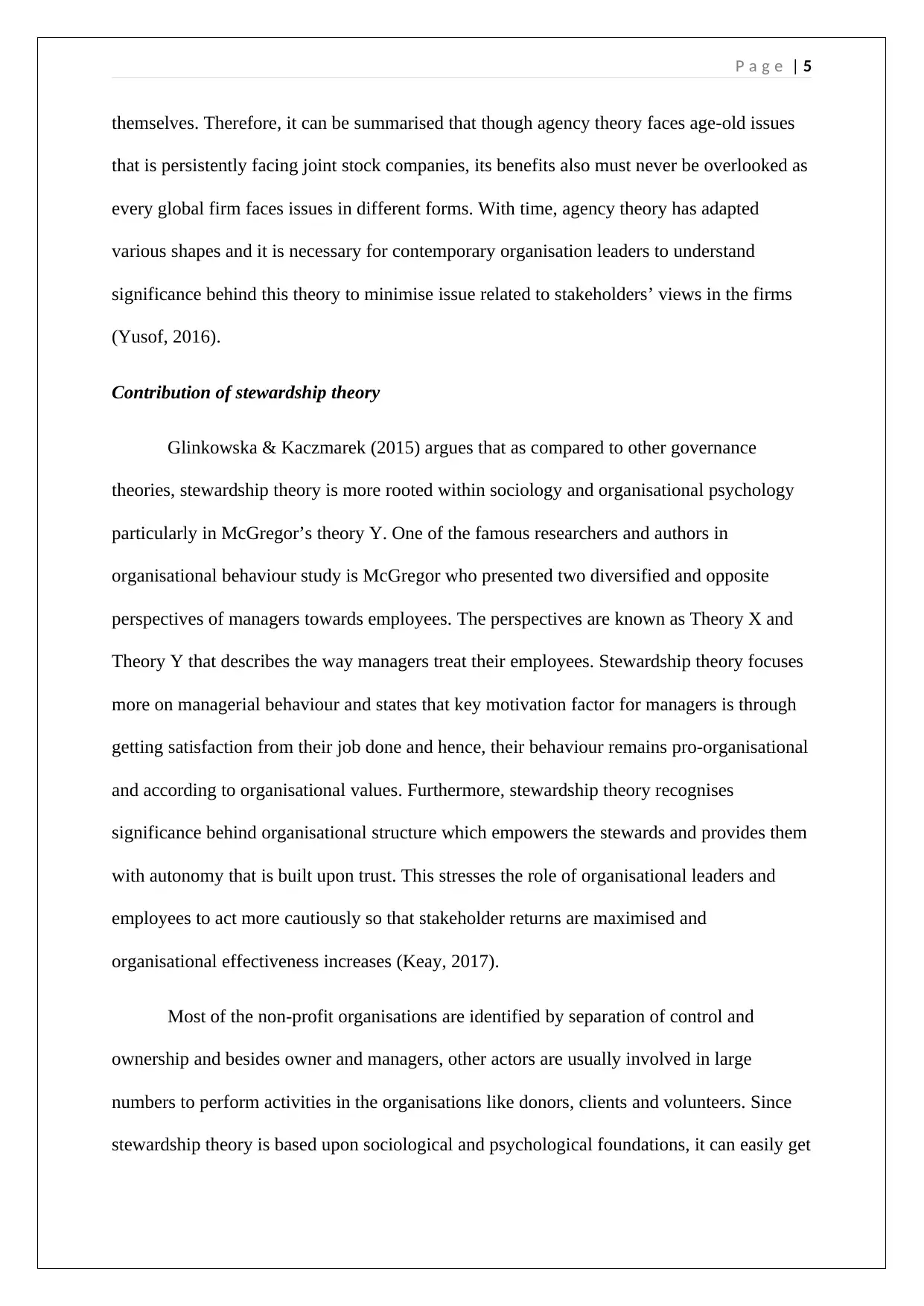
P a g e | 5
themselves. Therefore, it can be summarised that though agency theory faces age-old issues
that is persistently facing joint stock companies, its benefits also must never be overlooked as
every global firm faces issues in different forms. With time, agency theory has adapted
various shapes and it is necessary for contemporary organisation leaders to understand
significance behind this theory to minimise issue related to stakeholders’ views in the firms
(Yusof, 2016).
Contribution of stewardship theory
Glinkowska & Kaczmarek (2015) argues that as compared to other governance
theories, stewardship theory is more rooted within sociology and organisational psychology
particularly in McGregor’s theory Y. One of the famous researchers and authors in
organisational behaviour study is McGregor who presented two diversified and opposite
perspectives of managers towards employees. The perspectives are known as Theory X and
Theory Y that describes the way managers treat their employees. Stewardship theory focuses
more on managerial behaviour and states that key motivation factor for managers is through
getting satisfaction from their job done and hence, their behaviour remains pro-organisational
and according to organisational values. Furthermore, stewardship theory recognises
significance behind organisational structure which empowers the stewards and provides them
with autonomy that is built upon trust. This stresses the role of organisational leaders and
employees to act more cautiously so that stakeholder returns are maximised and
organisational effectiveness increases (Keay, 2017).
Most of the non-profit organisations are identified by separation of control and
ownership and besides owner and managers, other actors are usually involved in large
numbers to perform activities in the organisations like donors, clients and volunteers. Since
stewardship theory is based upon sociological and psychological foundations, it can easily get
themselves. Therefore, it can be summarised that though agency theory faces age-old issues
that is persistently facing joint stock companies, its benefits also must never be overlooked as
every global firm faces issues in different forms. With time, agency theory has adapted
various shapes and it is necessary for contemporary organisation leaders to understand
significance behind this theory to minimise issue related to stakeholders’ views in the firms
(Yusof, 2016).
Contribution of stewardship theory
Glinkowska & Kaczmarek (2015) argues that as compared to other governance
theories, stewardship theory is more rooted within sociology and organisational psychology
particularly in McGregor’s theory Y. One of the famous researchers and authors in
organisational behaviour study is McGregor who presented two diversified and opposite
perspectives of managers towards employees. The perspectives are known as Theory X and
Theory Y that describes the way managers treat their employees. Stewardship theory focuses
more on managerial behaviour and states that key motivation factor for managers is through
getting satisfaction from their job done and hence, their behaviour remains pro-organisational
and according to organisational values. Furthermore, stewardship theory recognises
significance behind organisational structure which empowers the stewards and provides them
with autonomy that is built upon trust. This stresses the role of organisational leaders and
employees to act more cautiously so that stakeholder returns are maximised and
organisational effectiveness increases (Keay, 2017).
Most of the non-profit organisations are identified by separation of control and
ownership and besides owner and managers, other actors are usually involved in large
numbers to perform activities in the organisations like donors, clients and volunteers. Since
stewardship theory is based upon sociological and psychological foundations, it can easily get
⊘ This is a preview!⊘
Do you want full access?
Subscribe today to unlock all pages.

Trusted by 1+ million students worldwide
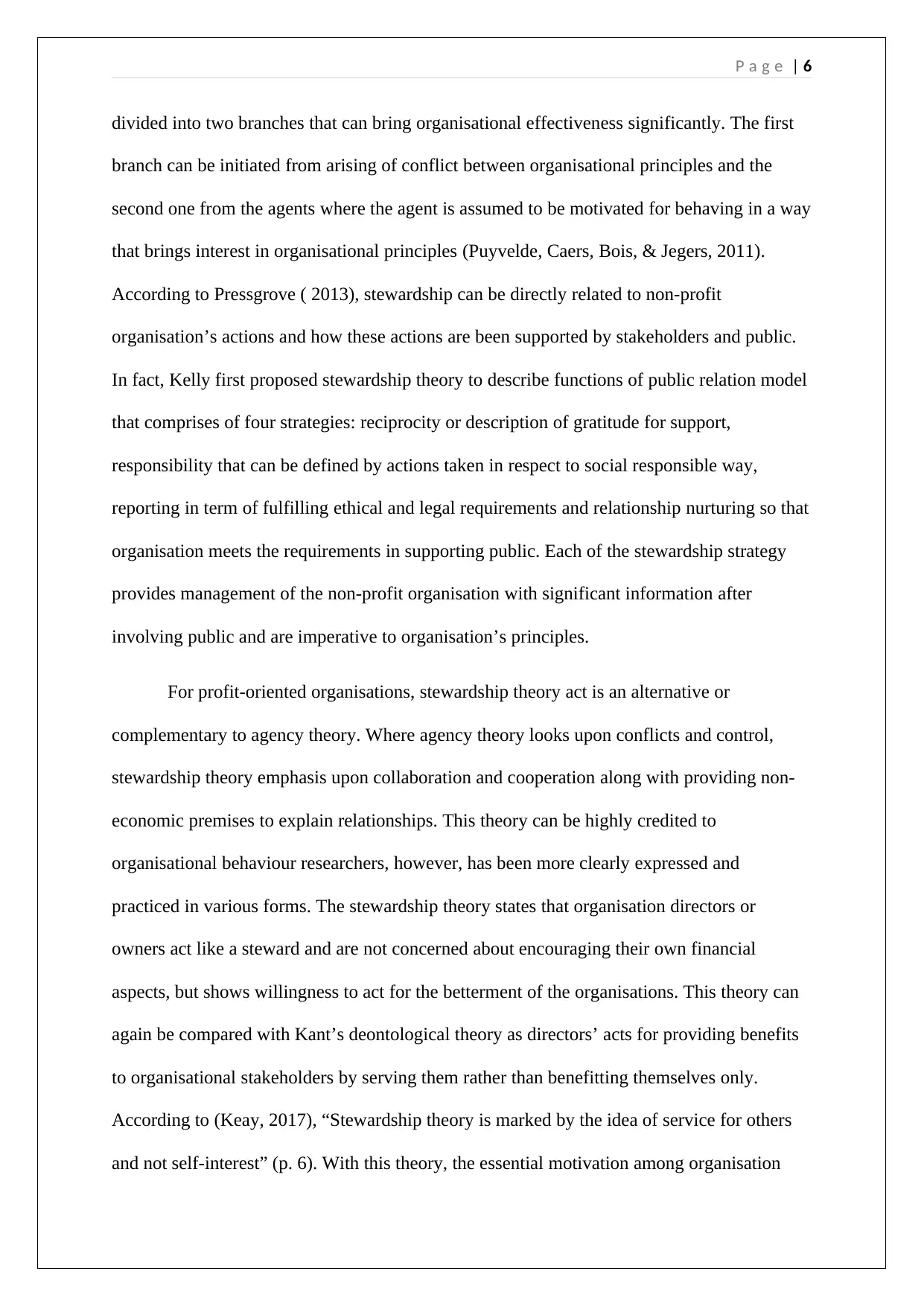
P a g e | 6
divided into two branches that can bring organisational effectiveness significantly. The first
branch can be initiated from arising of conflict between organisational principles and the
second one from the agents where the agent is assumed to be motivated for behaving in a way
that brings interest in organisational principles (Puyvelde, Caers, Bois, & Jegers, 2011).
According to Pressgrove ( 2013), stewardship can be directly related to non-profit
organisation’s actions and how these actions are been supported by stakeholders and public.
In fact, Kelly first proposed stewardship theory to describe functions of public relation model
that comprises of four strategies: reciprocity or description of gratitude for support,
responsibility that can be defined by actions taken in respect to social responsible way,
reporting in term of fulfilling ethical and legal requirements and relationship nurturing so that
organisation meets the requirements in supporting public. Each of the stewardship strategy
provides management of the non-profit organisation with significant information after
involving public and are imperative to organisation’s principles.
For profit-oriented organisations, stewardship theory act is an alternative or
complementary to agency theory. Where agency theory looks upon conflicts and control,
stewardship theory emphasis upon collaboration and cooperation along with providing non-
economic premises to explain relationships. This theory can be highly credited to
organisational behaviour researchers, however, has been more clearly expressed and
practiced in various forms. The stewardship theory states that organisation directors or
owners act like a steward and are not concerned about encouraging their own financial
aspects, but shows willingness to act for the betterment of the organisations. This theory can
again be compared with Kant’s deontological theory as directors’ acts for providing benefits
to organisational stakeholders by serving them rather than benefitting themselves only.
According to (Keay, 2017), “Stewardship theory is marked by the idea of service for others
and not self-interest” (p. 6). With this theory, the essential motivation among organisation
divided into two branches that can bring organisational effectiveness significantly. The first
branch can be initiated from arising of conflict between organisational principles and the
second one from the agents where the agent is assumed to be motivated for behaving in a way
that brings interest in organisational principles (Puyvelde, Caers, Bois, & Jegers, 2011).
According to Pressgrove ( 2013), stewardship can be directly related to non-profit
organisation’s actions and how these actions are been supported by stakeholders and public.
In fact, Kelly first proposed stewardship theory to describe functions of public relation model
that comprises of four strategies: reciprocity or description of gratitude for support,
responsibility that can be defined by actions taken in respect to social responsible way,
reporting in term of fulfilling ethical and legal requirements and relationship nurturing so that
organisation meets the requirements in supporting public. Each of the stewardship strategy
provides management of the non-profit organisation with significant information after
involving public and are imperative to organisation’s principles.
For profit-oriented organisations, stewardship theory act is an alternative or
complementary to agency theory. Where agency theory looks upon conflicts and control,
stewardship theory emphasis upon collaboration and cooperation along with providing non-
economic premises to explain relationships. This theory can be highly credited to
organisational behaviour researchers, however, has been more clearly expressed and
practiced in various forms. The stewardship theory states that organisation directors or
owners act like a steward and are not concerned about encouraging their own financial
aspects, but shows willingness to act for the betterment of the organisations. This theory can
again be compared with Kant’s deontological theory as directors’ acts for providing benefits
to organisational stakeholders by serving them rather than benefitting themselves only.
According to (Keay, 2017), “Stewardship theory is marked by the idea of service for others
and not self-interest” (p. 6). With this theory, the essential motivation among organisation
Paraphrase This Document
Need a fresh take? Get an instant paraphrase of this document with our AI Paraphraser
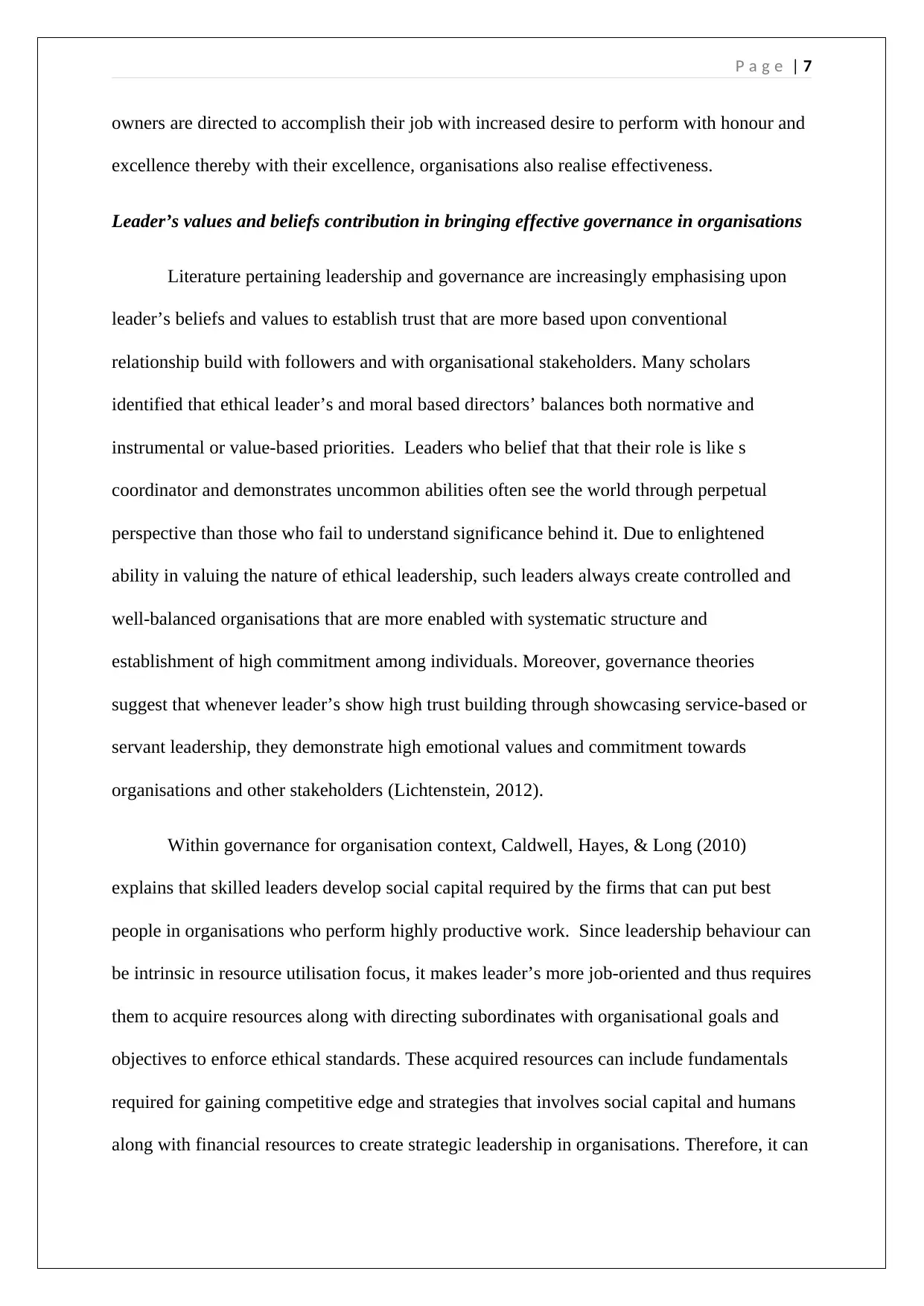
P a g e | 7
owners are directed to accomplish their job with increased desire to perform with honour and
excellence thereby with their excellence, organisations also realise effectiveness.
Leader’s values and beliefs contribution in bringing effective governance in organisations
Literature pertaining leadership and governance are increasingly emphasising upon
leader’s beliefs and values to establish trust that are more based upon conventional
relationship build with followers and with organisational stakeholders. Many scholars
identified that ethical leader’s and moral based directors’ balances both normative and
instrumental or value-based priorities. Leaders who belief that that their role is like s
coordinator and demonstrates uncommon abilities often see the world through perpetual
perspective than those who fail to understand significance behind it. Due to enlightened
ability in valuing the nature of ethical leadership, such leaders always create controlled and
well-balanced organisations that are more enabled with systematic structure and
establishment of high commitment among individuals. Moreover, governance theories
suggest that whenever leader’s show high trust building through showcasing service-based or
servant leadership, they demonstrate high emotional values and commitment towards
organisations and other stakeholders (Lichtenstein, 2012).
Within governance for organisation context, Caldwell, Hayes, & Long (2010)
explains that skilled leaders develop social capital required by the firms that can put best
people in organisations who perform highly productive work. Since leadership behaviour can
be intrinsic in resource utilisation focus, it makes leader’s more job-oriented and thus requires
them to acquire resources along with directing subordinates with organisational goals and
objectives to enforce ethical standards. These acquired resources can include fundamentals
required for gaining competitive edge and strategies that involves social capital and humans
along with financial resources to create strategic leadership in organisations. Therefore, it can
owners are directed to accomplish their job with increased desire to perform with honour and
excellence thereby with their excellence, organisations also realise effectiveness.
Leader’s values and beliefs contribution in bringing effective governance in organisations
Literature pertaining leadership and governance are increasingly emphasising upon
leader’s beliefs and values to establish trust that are more based upon conventional
relationship build with followers and with organisational stakeholders. Many scholars
identified that ethical leader’s and moral based directors’ balances both normative and
instrumental or value-based priorities. Leaders who belief that that their role is like s
coordinator and demonstrates uncommon abilities often see the world through perpetual
perspective than those who fail to understand significance behind it. Due to enlightened
ability in valuing the nature of ethical leadership, such leaders always create controlled and
well-balanced organisations that are more enabled with systematic structure and
establishment of high commitment among individuals. Moreover, governance theories
suggest that whenever leader’s show high trust building through showcasing service-based or
servant leadership, they demonstrate high emotional values and commitment towards
organisations and other stakeholders (Lichtenstein, 2012).
Within governance for organisation context, Caldwell, Hayes, & Long (2010)
explains that skilled leaders develop social capital required by the firms that can put best
people in organisations who perform highly productive work. Since leadership behaviour can
be intrinsic in resource utilisation focus, it makes leader’s more job-oriented and thus requires
them to acquire resources along with directing subordinates with organisational goals and
objectives to enforce ethical standards. These acquired resources can include fundamentals
required for gaining competitive edge and strategies that involves social capital and humans
along with financial resources to create strategic leadership in organisations. Therefore, it can
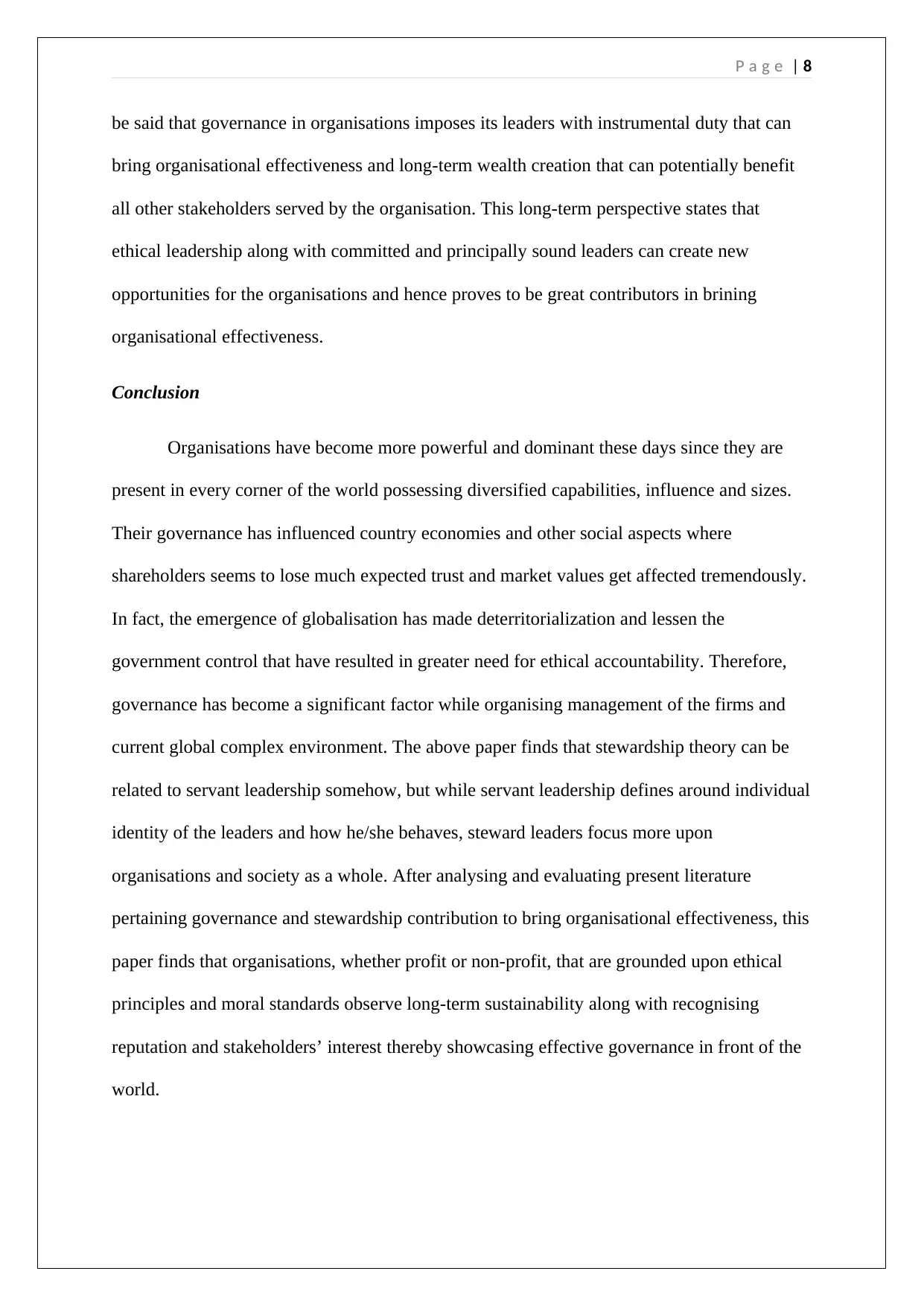
P a g e | 8
be said that governance in organisations imposes its leaders with instrumental duty that can
bring organisational effectiveness and long-term wealth creation that can potentially benefit
all other stakeholders served by the organisation. This long-term perspective states that
ethical leadership along with committed and principally sound leaders can create new
opportunities for the organisations and hence proves to be great contributors in brining
organisational effectiveness.
Conclusion
Organisations have become more powerful and dominant these days since they are
present in every corner of the world possessing diversified capabilities, influence and sizes.
Their governance has influenced country economies and other social aspects where
shareholders seems to lose much expected trust and market values get affected tremendously.
In fact, the emergence of globalisation has made deterritorialization and lessen the
government control that have resulted in greater need for ethical accountability. Therefore,
governance has become a significant factor while organising management of the firms and
current global complex environment. The above paper finds that stewardship theory can be
related to servant leadership somehow, but while servant leadership defines around individual
identity of the leaders and how he/she behaves, steward leaders focus more upon
organisations and society as a whole. After analysing and evaluating present literature
pertaining governance and stewardship contribution to bring organisational effectiveness, this
paper finds that organisations, whether profit or non-profit, that are grounded upon ethical
principles and moral standards observe long-term sustainability along with recognising
reputation and stakeholders’ interest thereby showcasing effective governance in front of the
world.
be said that governance in organisations imposes its leaders with instrumental duty that can
bring organisational effectiveness and long-term wealth creation that can potentially benefit
all other stakeholders served by the organisation. This long-term perspective states that
ethical leadership along with committed and principally sound leaders can create new
opportunities for the organisations and hence proves to be great contributors in brining
organisational effectiveness.
Conclusion
Organisations have become more powerful and dominant these days since they are
present in every corner of the world possessing diversified capabilities, influence and sizes.
Their governance has influenced country economies and other social aspects where
shareholders seems to lose much expected trust and market values get affected tremendously.
In fact, the emergence of globalisation has made deterritorialization and lessen the
government control that have resulted in greater need for ethical accountability. Therefore,
governance has become a significant factor while organising management of the firms and
current global complex environment. The above paper finds that stewardship theory can be
related to servant leadership somehow, but while servant leadership defines around individual
identity of the leaders and how he/she behaves, steward leaders focus more upon
organisations and society as a whole. After analysing and evaluating present literature
pertaining governance and stewardship contribution to bring organisational effectiveness, this
paper finds that organisations, whether profit or non-profit, that are grounded upon ethical
principles and moral standards observe long-term sustainability along with recognising
reputation and stakeholders’ interest thereby showcasing effective governance in front of the
world.
⊘ This is a preview!⊘
Do you want full access?
Subscribe today to unlock all pages.

Trusted by 1+ million students worldwide
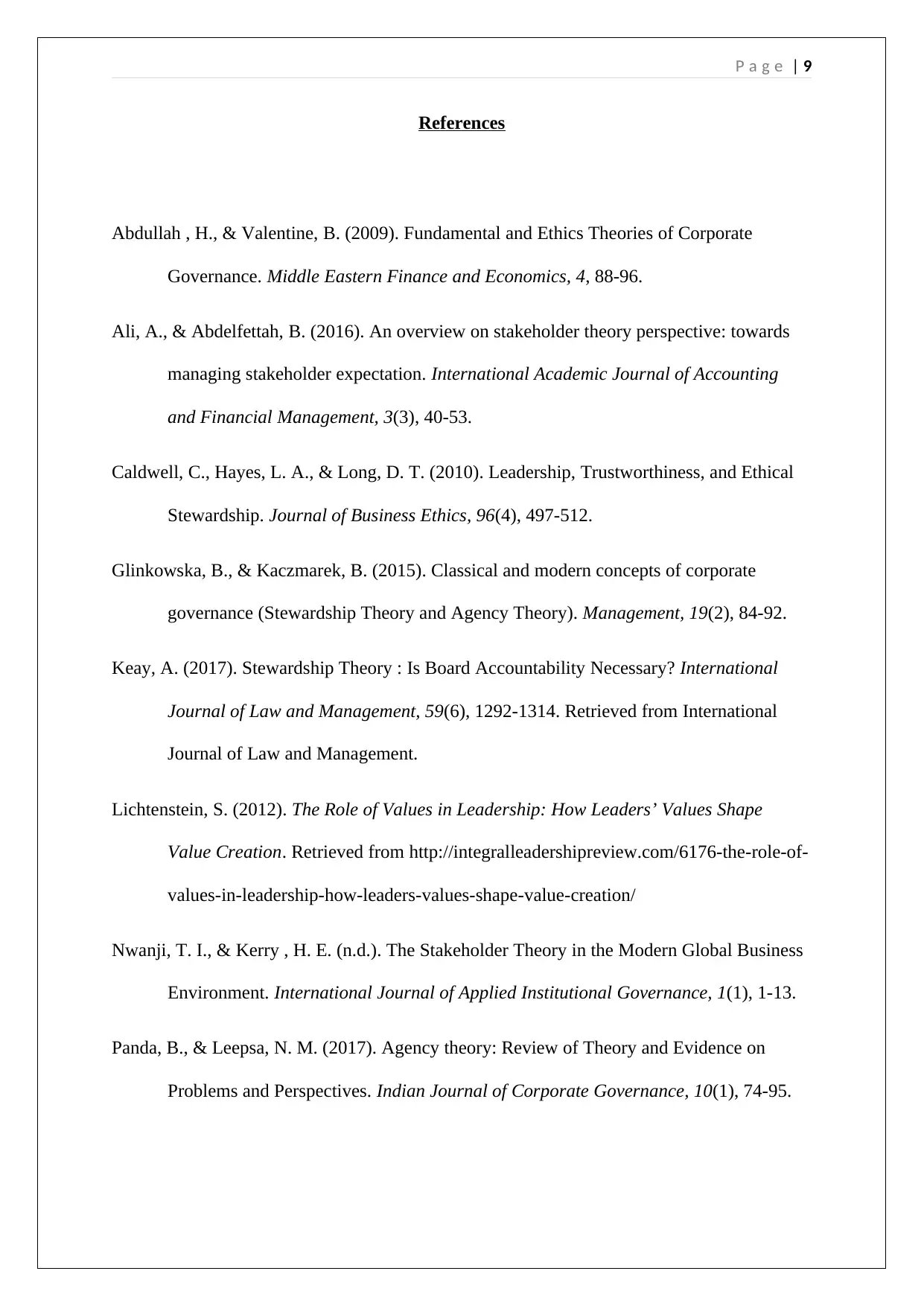
P a g e | 9
References
Abdullah , H., & Valentine, B. (2009). Fundamental and Ethics Theories of Corporate
Governance. Middle Eastern Finance and Economics, 4, 88-96.
Ali, A., & Abdelfettah, B. (2016). An overview on stakeholder theory perspective: towards
managing stakeholder expectation. International Academic Journal of Accounting
and Financial Management, 3(3), 40-53.
Caldwell, C., Hayes, L. A., & Long, D. T. (2010). Leadership, Trustworthiness, and Ethical
Stewardship. Journal of Business Ethics, 96(4), 497-512.
Glinkowska, B., & Kaczmarek, B. (2015). Classical and modern concepts of corporate
governance (Stewardship Theory and Agency Theory). Management, 19(2), 84-92.
Keay, A. (2017). Stewardship Theory : Is Board Accountability Necessary? International
Journal of Law and Management, 59(6), 1292-1314. Retrieved from International
Journal of Law and Management.
Lichtenstein, S. (2012). The Role of Values in Leadership: How Leaders’ Values Shape
Value Creation. Retrieved from http://integralleadershipreview.com/6176-the-role-of-
values-in-leadership-how-leaders-values-shape-value-creation/
Nwanji, T. I., & Kerry , H. E. (n.d.). The Stakeholder Theory in the Modern Global Business
Environment. International Journal of Applied Institutional Governance, 1(1), 1-13.
Panda, B., & Leepsa, N. M. (2017). Agency theory: Review of Theory and Evidence on
Problems and Perspectives. Indian Journal of Corporate Governance, 10(1), 74-95.
References
Abdullah , H., & Valentine, B. (2009). Fundamental and Ethics Theories of Corporate
Governance. Middle Eastern Finance and Economics, 4, 88-96.
Ali, A., & Abdelfettah, B. (2016). An overview on stakeholder theory perspective: towards
managing stakeholder expectation. International Academic Journal of Accounting
and Financial Management, 3(3), 40-53.
Caldwell, C., Hayes, L. A., & Long, D. T. (2010). Leadership, Trustworthiness, and Ethical
Stewardship. Journal of Business Ethics, 96(4), 497-512.
Glinkowska, B., & Kaczmarek, B. (2015). Classical and modern concepts of corporate
governance (Stewardship Theory and Agency Theory). Management, 19(2), 84-92.
Keay, A. (2017). Stewardship Theory : Is Board Accountability Necessary? International
Journal of Law and Management, 59(6), 1292-1314. Retrieved from International
Journal of Law and Management.
Lichtenstein, S. (2012). The Role of Values in Leadership: How Leaders’ Values Shape
Value Creation. Retrieved from http://integralleadershipreview.com/6176-the-role-of-
values-in-leadership-how-leaders-values-shape-value-creation/
Nwanji, T. I., & Kerry , H. E. (n.d.). The Stakeholder Theory in the Modern Global Business
Environment. International Journal of Applied Institutional Governance, 1(1), 1-13.
Panda, B., & Leepsa, N. M. (2017). Agency theory: Review of Theory and Evidence on
Problems and Perspectives. Indian Journal of Corporate Governance, 10(1), 74-95.
Paraphrase This Document
Need a fresh take? Get an instant paraphrase of this document with our AI Paraphraser
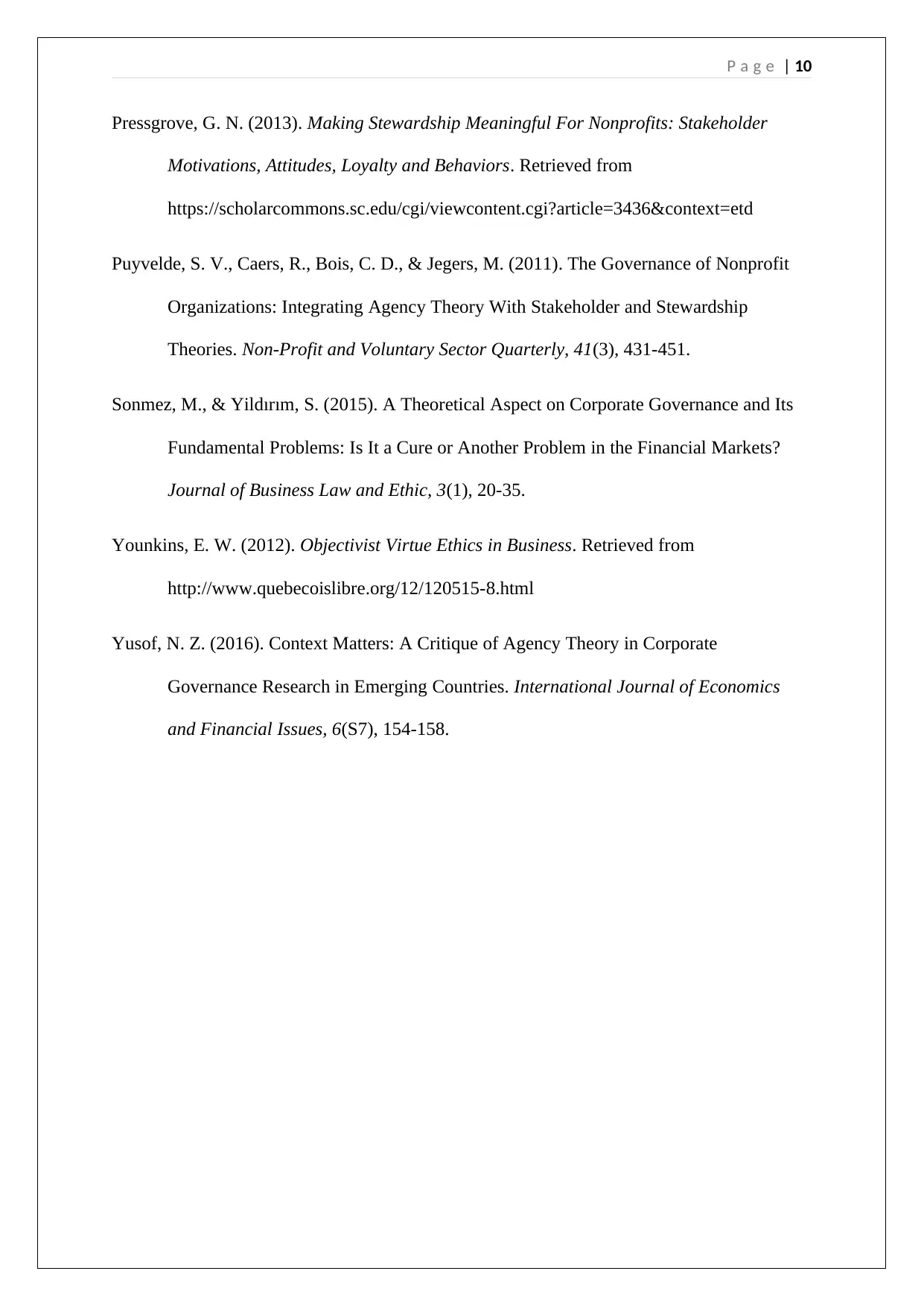
P a g e | 10
Pressgrove, G. N. (2013). Making Stewardship Meaningful For Nonprofits: Stakeholder
Motivations, Attitudes, Loyalty and Behaviors. Retrieved from
https://scholarcommons.sc.edu/cgi/viewcontent.cgi?article=3436&context=etd
Puyvelde, S. V., Caers, R., Bois, C. D., & Jegers, M. (2011). The Governance of Nonprofit
Organizations: Integrating Agency Theory With Stakeholder and Stewardship
Theories. Non-Profit and Voluntary Sector Quarterly, 41(3), 431-451.
Sonmez, M., & Yildırım, S. (2015). A Theoretical Aspect on Corporate Governance and Its
Fundamental Problems: Is It a Cure or Another Problem in the Financial Markets?
Journal of Business Law and Ethic, 3(1), 20-35.
Younkins, E. W. (2012). Objectivist Virtue Ethics in Business. Retrieved from
http://www.quebecoislibre.org/12/120515-8.html
Yusof, N. Z. (2016). Context Matters: A Critique of Agency Theory in Corporate
Governance Research in Emerging Countries. International Journal of Economics
and Financial Issues, 6(S7), 154-158.
Pressgrove, G. N. (2013). Making Stewardship Meaningful For Nonprofits: Stakeholder
Motivations, Attitudes, Loyalty and Behaviors. Retrieved from
https://scholarcommons.sc.edu/cgi/viewcontent.cgi?article=3436&context=etd
Puyvelde, S. V., Caers, R., Bois, C. D., & Jegers, M. (2011). The Governance of Nonprofit
Organizations: Integrating Agency Theory With Stakeholder and Stewardship
Theories. Non-Profit and Voluntary Sector Quarterly, 41(3), 431-451.
Sonmez, M., & Yildırım, S. (2015). A Theoretical Aspect on Corporate Governance and Its
Fundamental Problems: Is It a Cure or Another Problem in the Financial Markets?
Journal of Business Law and Ethic, 3(1), 20-35.
Younkins, E. W. (2012). Objectivist Virtue Ethics in Business. Retrieved from
http://www.quebecoislibre.org/12/120515-8.html
Yusof, N. Z. (2016). Context Matters: A Critique of Agency Theory in Corporate
Governance Research in Emerging Countries. International Journal of Economics
and Financial Issues, 6(S7), 154-158.
1 out of 11
Related Documents
Your All-in-One AI-Powered Toolkit for Academic Success.
+13062052269
info@desklib.com
Available 24*7 on WhatsApp / Email
![[object Object]](/_next/static/media/star-bottom.7253800d.svg)
Unlock your academic potential
Copyright © 2020–2026 A2Z Services. All Rights Reserved. Developed and managed by ZUCOL.





